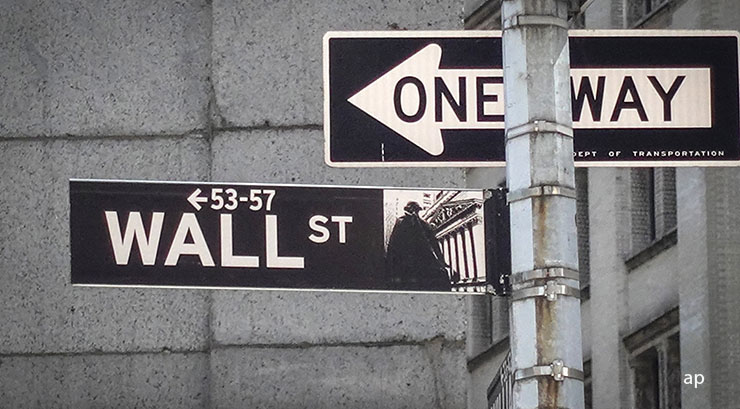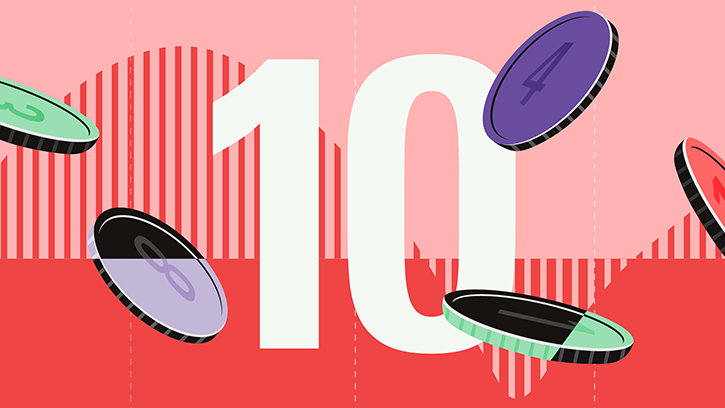
The US market crash last week has rattled European ETF investors, who have allocated billions to exchange-traded funds specialising in Wall Street stocks in recent years.
Morningstar data shows that the US large-cap blend equity ETF category, which is representative of the broader US market, is the largest in Europe with EUR 383 billion in assets under management and received net flows of EUR 52.5 billion in the past year alone, ranking first in investors' choices (as of end-July 2024).
How Much Wall Street Weighs in Global Equity ETFs
European ETF investors' exposure to the US market is even higher if one considers that the second largest category of assets under management in Europe is large-cap global equities with EUR 280 billion and net flows over the past year of EUR 47.4 billion. In this category, American stocks make up on average 64.7% of the total. For the sake of comparison, developed European markets account for "only" 15.2%.
One must also take into account the success of ETFs investing in US technology stocks, which exploded thanks to the rally in the Magnificent Seven that seemed unstoppable until the beginning of August. European investors have pumped EUR 5.5 billion into these instruments over the past twelve months, including EUR 4.5 billion since the beginning of 2024, when valuations were already high.
According to Morningstar analysts, at the time of the peak of the Morningstar US markets index on July 16 Nvidia (NVDA), Apple (AAPL), Meta (META) and Tesla (TSLA) were overvalued by 12-30%, while Alphabet (GOOGL), Microsoft (MSFT) and Amazon (AMZN) were also above their fair values discount. The declines in recent weeks, therefore, were even more painful for those who decided to ride the artificial intelligence trend, assuming investors sold after last week.
"The US market accounts for more than 70% of global equity markets, the highest level in history, with the Magnificent Seven alone weighing more than a fifth of the total," explains Michael Field, European market strategist at Morningstar.
"The US equity market has performed fantastically in recent years and when things are going well no one questions the level of concentration. But market shocks like the one we witnessed last week certainly give us pause for thought."
Is the Tech Stock Rally Over?
The US market index rose more than 50% in US dollar terms (+47.3 % in euro terms) from the beginning of 2023 to July 16, 2024. It then lost 8.6% (9.4% in euro terms) in the crash on August 5 before attempting to climb again, although it remains in the red since the mid-July peak. Driving the declines were technology stocks, particularly those such as Nvidia. The Morningstar US Technology index fell 13.4 % in US dollar terms (-13.5 % in euro terms) from 17 July to 5 August, after having posted +109.7 % (+105.7% in euro terms) from January 2023 to its peak in 2024, when markets hit new records.
ETFs, which in their more traditional version passively replicate a benchmark index, performed similarly. US large cap blended equities first posted cumulative gains of more than 40% in euro and then (as of July 17) average declines of 8.4% (as of 5 August). Technology-focused ETFs with the most exposure to US stocks lost more than 15% in just a few weeks, after gains as high as triple digits since early 2023. Finally, large-cap blend global equity ETFs fell 8.6 % on average after a 36.3% rally (figures in euros).
Although stock markets have since stabilised, what happened reminds us of the risks of over-exposure to a specific geographic area, but the same applies to sectors or individual stocks. All this while investors are already looking ahead the Federal Reserve’s next move and the upcoming US presidential elections.
US Stock Market Very Concentrated
At this stage, the risks of poor diversification are even more evident because the US market is highly concentrated. Despite talk of a turnaround in recent months, data for the second quarter of 2024 show that Wall Street owes almost all of its performance to technology stocks.
"The Morningstar US markets index was up 3.48% for the quarter," writes Bella Albrecht, associate data journalist at Morningstar. "Of that 3.48%, 3.46% came from the technology sector, more than four times the role played by the second-best sector, communications services."
"Artificial intelligence giants Nvidia, Microsoft, Apple, Amazon.com, Meta Platforms, Alphabet and Broadcom have contributed 24.39 percentage points of the 44.23 percentage points gained by the market since the start of 2023 (as of June 30) and currently have a combined weight of 29% in the index," Albrecht further explains.
The Weight of the Magnificent Seven
ETFs that physically replicate representative US market indices such as the S&P 500 or the MSCI USA show a concentration in the top 10 positions of around 34-35%.
Taking the two largest ETFs of this type, iShares Core S&P 500 USD Acc and Vanguard S&P 500 UCITS, which have 80.86 billion and 47.59 billion assets respectively, we see that the top positions in the portfolio in terms of number of stocks are for both four of the Magnificent Seven, namely Nvida, Apple, Amazon and Microsoft. If we look, however, at the stocks that weigh the most, the list of technology biggies gets longer by including Alphabet (in both share classes) and Meta Platforms. The only company in the Magnificent Seven that is not in the top 10, but ranks just below twelfth, is Tesla.
In the chart below we compare the iShares ETF with the Vanguard ETF in terms of the percentage weight of the Magnificent Seven in the portfolio. In the analysis, it is good to keep in mind that the update dates of the portfolios are different.
Looking now at how largest ETFs have performed, in terms of assets under management, from the peak of Wall Street prices to the crash on August 5. Losses have been more than 9% after gains of 46% to 48% since the beginning of 2023.
A European investor with a large-cap global equity ETF in his or her portfolio would have to factor in a concentration of between 22% and 23% in the top 10 stocks for more traditional instruments. Again, looking at the baskets of the largest replicators (iShares Core MSCI World ETF USD Acc and Vanguard FTSE All-World UCITS) in the top positions, in terms of weight of stocks, are the technology biggies that are riding the artificial intelligence trend.
The concentration of portfolios in the top 10 stocks is even higher in ETFs with a focus on technology. The largest of its kind in Europe, iShares S&P 500 Info Tech Sect ETF$Acc has 74.4 % of assets in the top ten positions . The second largest, Xtrackers MSCI World IT ETF 1C, has a 68% concentration (data available as of 6 August). The weight of Microsoft, Apple and Nvidia is in double figures (see chart below).
Diversification Remains the Key to Success
This analysis shows that the mix of global, US and technology equity ETFs does not guarantee risk diversification in markets as concentrated as they are today. On the contrary, it exposes them to the headwinds that are blowing on Wall Street.
"One of Warren Buffett's most famous sayings is that only when the tide recedes can you see who has swum naked. Sometimes the tide recedes very quickly and unexpectedly, as happened this week with the massive sell-off in Japan and contagion to other stock markets. Now the tide has turned again, but the episode has left many completely exposed to their nakedness," says José Garcia-Zarate, associate director for passive strategies research at Morningstar.
"Putting all your eggs in one basket, even if it looks very attractive, is not a good idea. Diversification remains one of the key principles for successful long-term investing."
• This article was originally published in Italian and has been translated using AI






























